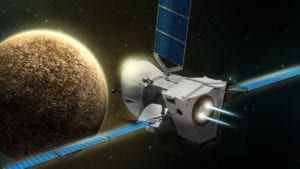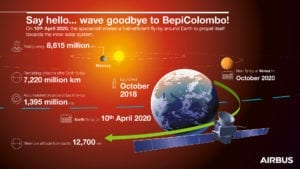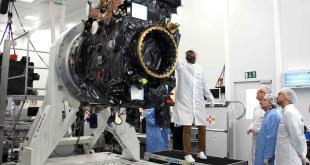
The Airbus built BepiColombo mission will make a fly-by past Earth on 10 April 2020 as it continues on its epic journey to Mercury.
The joint European Space Agency and Japanese Space Agency spacecraft will swing past Earth at about 13,000 km away, closer than navigation satellites (GPS, Galileo). It will be BepiColombo’s final glimpse of Earth before it continues on its seven year, 8.5 billion kilometre journey to the Solar System’s innermost, smallest and least explored planet, Mercury. The last time the spacecraft saw Earth was 18 months ago in October 2018, when it was launched on an Ariane 5.
BepiColombo is not due to arrive at Mercury until 5 December 2025, but to get there safely and at the right speed to be captured by Mercury’s gravity, it must do nine flybys of the inner planets, one past Earth, two at Venus and six flybys at Mercury. After arrival, the spacecraft will capture data for a year with the possibility of extending the mission.
BepiColombo will collect measurements to study the composition, geophysics, atmosphere, magnetosphere and history of Mercury as well as testing Einstein’s theory of general relativity. The 16 scientific instruments will also provide insights into the characteristics of Mercury’s magnetic field and how it interacts with the solar wind.

Philippe Pham, Head of Earth Observation, Navigation and Science said: “This flyby marks a great achievement and major milestone for Airbus. Teams across five countries worked together to successfully develop and launch the spacecraft on a complex mission to Mercury.”
The journey will total some 8.5 billion km, completing 18 orbits around the Sun before entering the spacecraft’s operational orbit and beginning scientific exploration of the planet Mercury.





